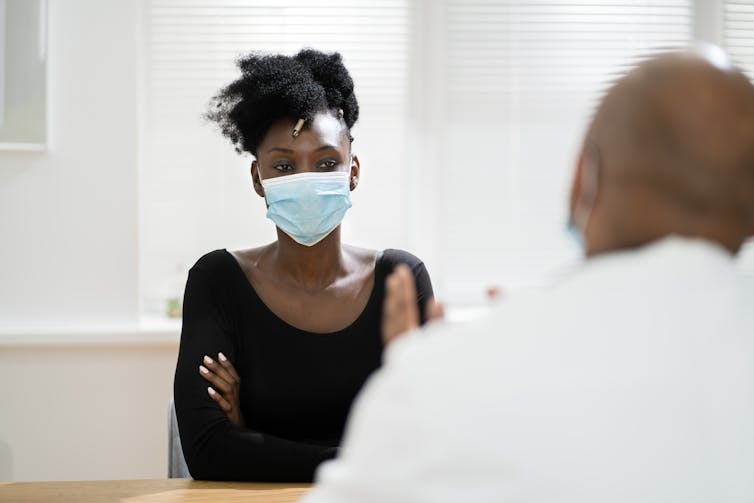
Rostislav_Sedlacek/Shutterstock
While hundreds of thousands of people are still getting COVID every day across the globe, reassuringly, the number of people dying as a result of the infection has dropped significantly thanks to effective vaccines and treatments.
Yet for many people, the consequences of COVID continue well beyond the initial infection, in the form of long COVID. We wanted to understand what factors might make people more or less susceptible to ongoing symptoms. In a new study we found that women who are overweight are at highest risk of developing long COVID.
Long COVID can include symptoms such as fatigue, shortness of breath, palpitations, “brain fog” (for example, problems with concentration or memory) and many others. These symptoms can be debilitating and affect a person’s quality of life significantly.
The term long COVID encompasses both “ongoing symptomatic COVID-19” (symptoms four to 12 weeks after infection) and “post COVID syndrome” (symptoms which continue for 12 weeks or more). Our research focused on the latter.
We surveyed people in Norfolk, England, who had tested positive for COVID at least 12 weeks prior. From a total of 1,487 participants who completed the online questionnaire, 774 respondents (52%) said they were experiencing at least one long COVID symptom. The most commonly reported symptoms were anxiety (32%), general pain or discomfort (28%), fatigue (25%), insomnia (22%) and cognitive impairment (20%).
It’s possible such a large proportion of participants in our study reported long COVID symptoms partly because of a bias in the recruitment process. People with symptoms may have been more inclined to respond to the survey.
But the main element of our study was in comparing those who did report symptoms with those who didn’t. We explored what factors might make people more or less likely to develop long COVID by looking at participants’ medical records. We took into account factors including body mass index (BMI), sex, medication use, other health conditions, and whether the person lived in a deprived area or not.
Read more:
Six common COVID myths busted by a virologist and a public health expert
We found that women and people with high BMI had an increased risk of developing long COVID compared with men and people with normal or low BMI respectively. So women with high BMI were at greatest risk.
We also observed a trend suggesting that older people may be more likely to get long COVID, but our study didn’t include enough patients to confirm this (we didn’t reach statistical significance). However, this observation is supported in other studies.
Other studies have similarly shown that women are at greater risk of developing long COVID. The reasons for this are unclear, though scientists have hypothesised that female sex hormones may play a role.

Andrey_Popov/Shutterstock
Meanwhile, research has also identified high BMI and obesity as risk factors for long COVID.
We don’t know exactly why this might be, but some have suggested that because obesity leads to more inflammation in the body, people who are obese take longer to get rid of the virus, in turn predisposing them to long COVID. Linked to that, we know people who are obese have weaker immune systems, which not only puts them at higher risk of poor outcomes from the initial infection, but also makes clearing the virus more difficult.
Protecting yourself
One limitation of our study is that it was only in one area of England. More research will be needed to capture wider trends, particularly in ethnic minority groups. Our study also looked at people who developed long COVID from an infection in 2020, before COVID vaccines became available. So it would be good to replicate similar research now.
Recent studies have actually shown that people who have been vaccinated are significantly less likely to develop long COVID. Given this, and since COVID vaccination reduces the severity of a COVID infection in the first instance, people should go out and get vaccinated if they’re not up to date.
Read more:
New cases of severe long COVID appear to be dropping – and vaccination is probably key
It seems almost impossible not to catch COVID nowadays, in most countries at least, given the vast majority of protective measures have gradually disappeared. But day to day, keeping physically active and maintaining a healthy diet before any COVID infection could also go some way to protecting against the worst and ongoing effects of the virus.
![]()
The authors do not work for, consult, own shares in or receive funding from any company or organisation that would benefit from this article, and have disclosed no relevant affiliations beyond their academic appointment.
Source: TheConversation


